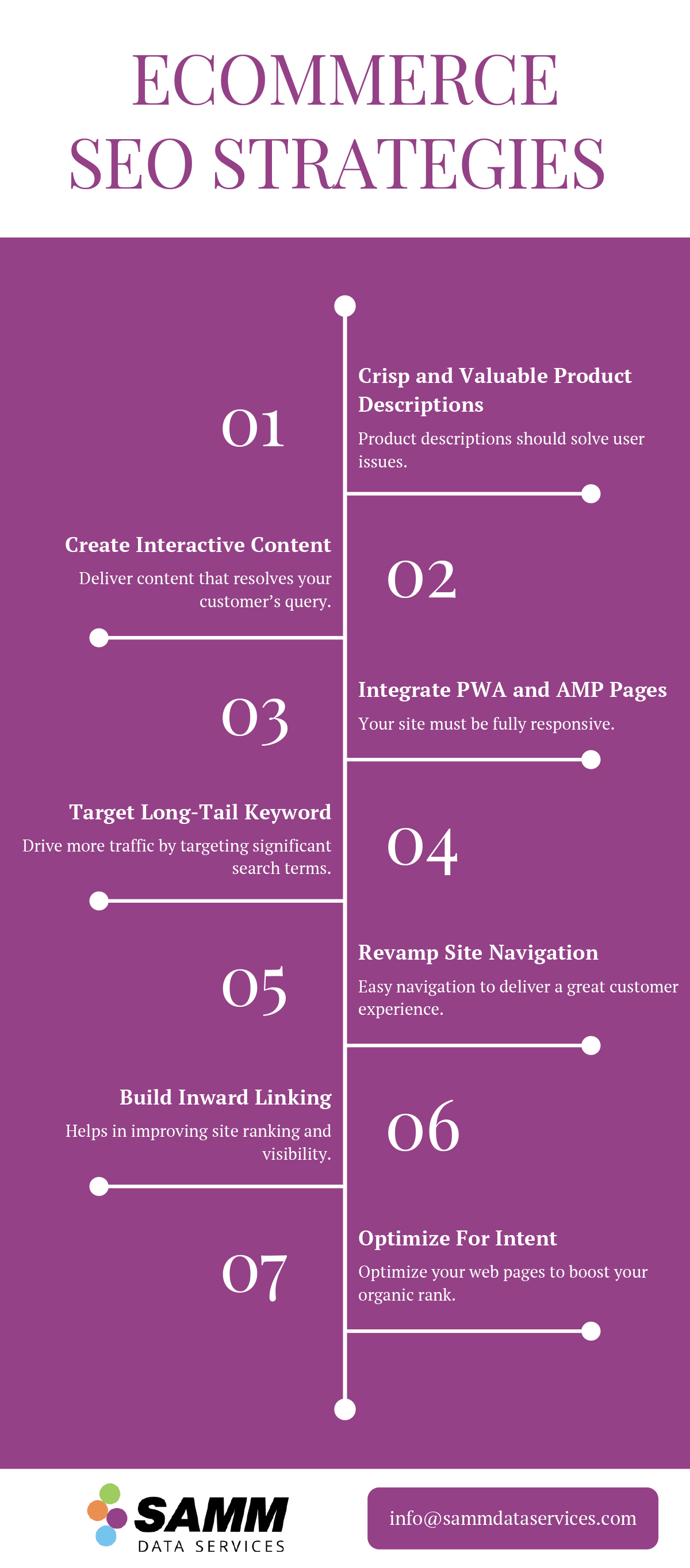
If you are running an eCommerce site, you already know the constant competition of showing up on search results. With new developments and continuous swings in the eCommerce sector, retailers are implementing every strategy to enhance their store visibility.
But have you considered that you might be missing out on the most essential method to drive your online business? The answer is ‘search engine optimization’. It is the most common yet effective way to attract more audiences to your website. Most essentially eCommerce PPC services are an efficient way to expand a brand’s online presence and increase sales.
This blog will guide you through the key tactics of SEO, how to develop an eCommerce strategy, and demonstrate powerful SEO strategies to help you achieve long-term profitability.
Table of Content
- Integrate Core Elements in Your eCommerce SEO Strategy
- How to Develop an Ecommerce SEO Strategy?
- Latest eCommerce Strategies For Your Online Store
- FAQs
- Achieve Higher Site Ranking With Our Reliable Ecommerce SEO Services
- Conclusion
Integrate Core Elements in Your eCommerce SEO Strategy
- Most crucial factor- keyword research to drive the target audience.
- Improvise site architecture depending on your target keyword.
- Focus on content marketing to enhance organic traffic.
- Create interlinks to hook customers at your eCommerce store.
- Use Google Analytics to monitor your moves.

How to Develop an eCommerce SEO Strategy?
eCommerce indeed is a huge task to deal with whether you have just started your online store or are at the peak of your business. It does take time, but you can fuel the process by implementing powerful strategies and keeping the below points in mind:
Prioritize the pages that receive the highest traffic followed by the flagship products and optimize first products.
Create a workflow to sort the essential parts you want to focus on- picking keywords, adding meta descriptions, adding images and tags, etc.
Another most important thing is competitor analysis. Make sure to check out your competitor’s sites and implement various strategies to make it 10x better. Let’s head over to some of the latest strategies to improve your eCommerce site SEO.
Latest eCommerce Strategies For Your Online Store
1. Strong Keyword Planning
Keyword research is the foremost essential part of eCommerce SEO. Any error at this step can hamper your campaign to the core. So make sure that you don’t:
- Target keywords that need more time to rank.
- Target keywords that don’t drive sufficient traffic.
SEO keywords are mainly divided into three groups based on the user intent:
- Commercial keywords: keywords that urge buyers to purchase a particular item or indicate the intent of buying. For example: ‘buy white shoes’’, white shoe prices’.
- Informational keywords: keywords that target an audience who are looking for something to learn. For example: ‘how to guide’, ‘tips’, ‘tutorials’, etc.
- Navigational keywords: keywords focusing on a particular product, brand, or location.
2. Fix Site Issues
With several eCommerce stores flooding online, the customer’s expectations have increased, and delivering a seamless user experience has become the need of the hour. Unfortunately, many eCommerce sites end up delivering bad user experience (UX), complicated navigation, and more.
To fix these issues, you can strategize your way by monitoring your customer behavior on the following basis:
- Use session recording tools to track the number of visitors and their activities.
- Check the pages which are often left by the visitors or pages that don’t have high spending time.
- Roll out feedback forms to clearly understand your customer requirements and experiences.
3. Catchy Meta Descriptions
A meta description basically serves the purpose of summing up a page’s content but in a very short and precise manner. You might have seen that every search result comes up with a mini headline underneath the page’s title and URL, it is the meta description.
Meta descriptions are important as it drives organic click-through rate (CTR). Make sure your search results have relevant and easy-to-read descriptions. As it plays a crucial role in promoting a page’s value and influences the user’s decision to click on it. Or you can directly consider eCommerce PPC Services to manage your campaign.
Meta descriptions are a very tiny part of SEO but largely contribute to increasing the organic CTR. It summons the idea, how many people click on a specific URL after reading the description.
Here are some proven tips for writing effective meta descriptions:
- Incorporate target keywords in the meta description. The reason is whenever a user searches a particular keyword, Google will show your description, hence enhancing your site ranking.
- Highlight benefits in the meta description, consider it as a mini promotional activity.
- Also, make sure that it doesn’t sound like a sales pitch. Keep it simple and natural.
- Be specific about how the user is going to benefit from your product page.
- Use a CTA that grabs the user’s attention, especially if it is related to a product page.
4. Create Content To Answer User’s Queries
Most of the site’s ranking is determined through content. Google’s goal is to organize all the scattered information and display the most useful and valuable information. Thus, you need to produce content that answers your user’s queries. Brainstorm user’s goals, requirements, desires, or needs.
To create user-centric content, take ideas from the below-mentioned tips:
- Understand from the user perspective, which sort of content would make you buy a specific product? A product that addresses user issues and presents all the solutions related to it or a product with a complicated description. Of Course, the one that addresses user issues.
- Create less but significant. Do not focus on creating bulk content. Make sure to add content that fulfills exactly what it promises. Jaws down every feature, attribute, and element in a well-organized manner. Make it easily scannable and simple to understand.
- Deliver content keeping in mind the end-user. Do not play around with the algorithm, else it might affect your ranking.
5. Easy Navigable Site Architecture
While adding categories and products to your store, make sure to keep the overall site mapping simple as it plays a vital role in search optimization. Specifically, when you have categories, subcategories, and more products enlisted within them, you need to opt for eCommerce Catalog Management for managing your store.
Whenever a user lands on your website, a clear interlinking structure will help them to find a product or category easily without any hassle. This will provide them a seamless experience and make them want to visit your store again. Do not complicate the process, make sure that any visitor can access anything on your website within three clicks.
6. Build Internal Links
Internal linking is done to fulfill the following purposes:
- Boosts the entire SEO of your site by showing different pages and how they are interlinked to one another.
- Visitors spend more time on your site as they get encouraged to explore different sections of your eCommerce store.
To make things a lot easier, eCommerce catalog management services can help you manage your store.
7. Incorporate Responsive Design
Mobile shopping has increased more than ever before as more stores transform into the digital domain. Thus, make sure to integrate a responsive design that doesn’t crash your user experience and also improvises the search results. Mobile-friendly apps and sites are considered to rank as compared to the stores which are not.
8. Fix Page Load Speed
One of the factors that affect your eCommerce site ranking is page load speed- which applies to both desktop and mobile. The quicker your page loads, the better your ranking.
You might be wondering how to improve the page loading time. For this, you need to analyze and eliminate the unuseful elements that don’t contribute to your site. For example, if one of the pages has a big white background image, any plugins or add-ons, etc.
FAQs
1. How long will it take to get rankings?
Website optimization is anything but an overnight methodology. The initial not many months are committed to making updates to your site and sitting tight for the web search tools to list the changes. It generally requires 3-9 months to start seeing new rankings.
2. When will the traffic at my site increase?
Traffic is normally an immediate consequence of an increment in rankings. When your rankings start to expand, you will likewise start to see steady expansions in rush hour gridlock to your site. Remember that new rankings and traffic are not immediate, it requires a couple of months to finish the fundamental updates and get them recorded before you will start to see these increments.
3. Would it be a good idea to opt for PPC?
Pay Per Click is an extraordinary extra procedure to enhance your SEO endeavors and can assist with upgrading pertinent traffic. Contingent upon your specific site, industry, and the seriousness of the keywords you need to pursue, a decent organization will suggest PPC on a case-per-case premise.
4. Should I continue SEO after achieving good rankings?
Since search engines are designed in a way that their algorithms are constantly getting changes. So does the ranking oscillates. Reaching a high rank on search results is one thing but consistently staying on top is where SEO is needed. Regular updates, research, and testing URLs, etc. are the elements to keep your rankings high which is only possible through SEO.
Achieve Higher Site Ranking With Our Reliable Ecommerce SEO Services
Handling and running an eCommerce store isn’t just a piece of cake. Your store must have all the features and attributes as an eCommerce platform but still face low or poor conversion rates. This is where eCommerce SEO services come into the picture. SEO is one of the sustainable and budget-friendly ways to increase your sales and long-term revenue.
As a leading agency, we will help you enhance your site visibility and ranking by offering comprehensive eCommerce SEO solutions. Our highly experienced professionals are well versed in website auditing, keyword research, on-page optimization, content generation, site structure, and more.
Conclusion
eCommerce businesses and the approach to running them have changed immensely in the last few years. The market is only going to boom and become more competitive as well as challenging. So to stay ahead in the search ranking and achieve long-term profitability, businesses need to opt for eCommerce PPC services. To gain maximum ROI kindly drop us your query at info@sammdataservices.com.

